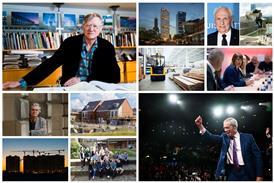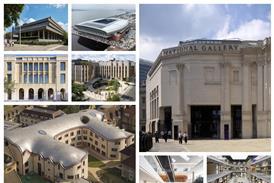To build an optimistic and robust vision for the future, cities need to mobilise the energy and enthusiasm of all their citizens, writes Dav Bansal

Envisioning the future of something as lively, networked, and dynamic as a city is inherently challenging, but this unknown is also what makes it so exciting, and is the reason why city planning has been at the core of civic, political and economic life in some form or another for millennia - with ideas around planning passing through countless trends and paradigms along the way.
While for much of the 20th century, it was a Modernist, top-down approach that was rolled out in cities around the world (the anachronisms of which cities like Birmingham are still living with), today we’ve come to understand that city planning should be approached far more openly and collaboratively than has historically been the case. Challenges around the climate and nature, alongside social inclusivity, mobility, and wellbeing are coming to the fore.
At Howells, we’ve been fortunate enough to have worked alongside Birmingham City Council and Arcadis in the recent launch of the Our Future City – Central Birmingham 2040 vision (OFC). Key to the future success of OFC will be changing the culture and process of city planning to be more aligned with this shift.
We need to move away from rigid plans and top-down directives, and towards bold ideas and bottom-up partnerships. Its purpose – as with any similarly ambitious city vision – is to set out a long-term framework from which an inclusive and sustainable global city can emerge.
With Birmingham City Council recently having issued a section 114 notice, bold plans are needed more than ever. Indeed, Birmingham needs a thriving core – with more residents, businesses, services and cultural amenities taking full advantage of their proximity to one another.
The upfront investment will be rewarded by increased revenue – Birmingham is already booming with record levels of inward investment and enjoyed one of the country’s fastest economic recoveries from the pandemic. With its residual assets and entrepreneurial ‘can-do’ attitude, there is no lack of ambition for its future.
To encourage an equitable vision, and to reflect the complexity of this great 21st century city, an honest and open dialogue is required from the outset, involving a diverse consortium of citizens, businesses, investors, and other partners. Such frameworks are more resilient in the face of financial shocks, such as the one that Birmingham is currently facing. This only reinforces why it is ever more important to work together in achieving a city’s shared objectives.
Because the OFC framework is focused on connections between the city centre and its surrounding neighbourhoods, it is necessarily contingent on a broad group of stakeholders. These range from private and social housing developers, to international corporations and investors, world class cultural and education organisations, active travel groups, public transport providers, green infrastructure experts and biodiversity consultants.
This pivot in focus, away from the heart of the city to the surrounding neighbourhoods, and away from an elite group of stakeholders to a partnership of everyday makers and doers, requires that historic barriers between planners and the planned-for are broken down. Birmingham is a city of 94 languages, and a multitude of communities, each of which must be heard - whether their focus is on better public spaces, improved travel connections, more urban greening, or other priorities.
The new challenges the city faces, and their scale, demand a response that is both inclusive, and ambitious
During the industrial revolution, Birmingham was the ‘city of a thousand trades’. We need to make sure that it can now move with emerging sectors, to retain, nurture, and draw in talent, to become a city of a thousand innovations. Furthermore, these partnerships can help build civic pride at a crucial and difficult time for the council.
The OFC vision is clear in its ambition: the creation of 74,000 new jobs and up to 35,000 new homes, while also transforming the inner ring road into an inner city green space and doubling the amount of active travel routes to 200km. It is a big task, in which overall success depends on many different, and interdependent elements. But asking ambitious questions about the future of the city is exactly what will bring people together.
It demands that everyone envisions their place in its future, and gets on board with the collaborative action that is needed. This partnership process is already underway at Birmingham Innovation Quarter, a triple helix partnership where education, research, emerging tech sectors, housing, and public spaces around existing assets are shaping new opportunities for all.
The public and stakeholder consultation for the OFC 2040 vision has recently come to its end, and Howells, along with our partners, look forward to as many opinions as possible on how we can make it work for the city. Our most successful projects are always the ones in which we’re challenged, and this is no different. The OFC is about shaping a vision from multiple perspectives, and empowering everyone involved to deliver it collectively, and at pace.
This approach stands in clear contrast to previous city-wide visions, where chosen experts were invited to shape the future of Birmingham. The new challenges the city faces, and their scale, demand a response that is both inclusive, and ambitious; a framework which can mobilise many different parties in the same direction of travel.
Because the OFC is a vision, not a memory, we can look to past and present iterations of the city for signposts, but not for blueprints. Instead of dictating what the future of the city will be, it should instead create a set of conditions in which it can find out for itself - the only way we can achieve this is by embracing this new culture of city planning, and building on the power of collaboration.
>> Also read: Howells set to unveil 20-year vision for Birmingham’s green transformation
>> Also read: Birmingham is putting the public realm at the heart of its future vision
>> Also read: Birmingham council declares itself effectively bankrupt
Postscript
Dav Bansal is a partner at Howells
















1 Readers' comment